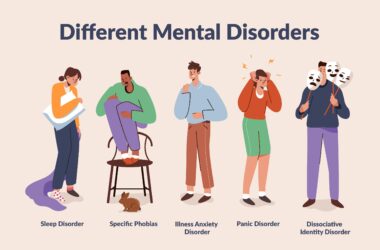With our fast-paced and often chaotic world, it is more crucial than ever to find a way to be balanced and healthy. We uncover a basic relationship between our mental and physical health when we delve into the intricacies of mindfulness and health, which surpasses ordinary understanding.
This blog aims to break down this intricate mind body connection, mind body connection therapy and demonstrate how mindfulness can help one reach a state of mental and physical balance.
The Link Between Mind Body Connection
The Power of Thoughts
Our physical health is profoundly affected by our thoughts, which are often disregarded as mere ideas. Scientists have shown that keeping a positive outlook helps strengthen the immune system and improves overall health. The flip side is stress, which can be caused by negative thoughts, weakens our immune systems and makes us more prone to a range of ailments.
Emotional Harmony and Physical Health
Rather than being transient, emotions are fundamental to the mind-body connection. Chronic stress, anxiety, or depression can lead to physical health issues like heart disease and gastrointestinal disorders. Recognising the profound impact of mental and emotional health on one’s physical health is a crucial first step in achieving holistic wellness.
Read More: Stop Late Night Snacking
A Look at the Brain’s Reactions to Exercise and the Neurochemistry of Health
Getting your muscles and cardiovascular system moving has mental and emotional benefits as well. Examine the beneficial effects on neurotransmitters like serotonin and dopamine as well as the release of endorphins that occur during exercise. Get the inside scoop on how exercise may be your best friend when it comes to battling mental health issues like depression, anxiety, and stress.
The Link Between the Microbiome and Mental Health
Dig into the intriguing connection between your digestive system and your brain. There is mounting evidence that the enormous community of microbes that lives in our digestive tract—the gut microbiome—may have a role in psychological well-being. Explore the studies that shed light on the two-way communication between the digestive tract and the brain and how it relates to mental health issues like anxiety and depression.
The Significance of Sleep for Mental Health
Restoring one’s physical and mental health requires regular, high-quality sleep. Learn how poor sleep hygiene can negatively affect mood and cognitive function, how sleep disruptions can lead to disorders like insomnia, and the complex web of relationships between the two.
Read More: Recommended Exercise By Age
The Importance of a Well-Rounded Diet for Brain Health
Learn all about how healthy eating can improve your mental health. A lower risk of mental health issues has been associated with certain food patterns. Learn how vital nutrients like antioxidants and omega-3 fatty acids affect mental acuity and emotional fortitude.
Conquering the Emotional Chasm of Living with a Chronic Illness and Mental Health Issues
Mental health might suffer as a result of living with physical ailments that are chronic. Delve into the intangibles of living with a chronic illness, such as the mental toll that pain may take and the value of integrative medicine in addressing one’s physical and mental health.
The Feedback Loop Between the Body and the Mind: Stress, Cortisol, and Mental Resilience
Learn about the effects of stress on mind body connection therapy, especially the secretion of the stress hormone cortisol, and how it relates to psychological well-being. Learn about mind body connections practices and the significance of building resilience to deal with life’s obstacles as methods for managing stress.
Read More: Social Support And Mental Health
Cultivating Mind body Connection: Practical Tips
A Morning Practice for Mindfulness
Start each day with deliberate practice. Before you even think about getting out of bed, sit quietly for a while and concentrate on your breathing. Make a point to fully appreciate each inhale and exhale. This encourages a serene and composed frame of mind and creates a good tone for the day.
Pauses for Mindful Breathing
Throughout the day, take brief pauses to focus on your breathing. Put your thoughts on your breath for a moment, maybe even closing your eyes if it helps. As you inhale, let your breath fill your lungs, and then gently exhale. You can bring yourself to the present moment with this easy practice, and you can do it anywhere.
Approaching Food with Mindfulness
Make mind body connection along with mindful eating a part of your daily routine. Observe the food around you and take note of its appearance, feel, and taste. Enjoy every bite by chewing gently. To get the most out of your dinner, put down your phone or focus on one thing at a time.
Connect with Nature
Take some time to relax and observe nature around you. Immerse yourself in the present, whether it’s a stroll through the park or a quiet moment in your own backyard. Take in the sights, smells, and sensations of your environment. Making peace with one’s natural surroundings through this connection can be restorative and calming.
Use technology with mindfulness by giving it some thought before you do it. Rather than being online all the time, set aside time to check your email and social media. Never multitask while using a device; instead, give it your undivided focus. A more present and focused state of mind can be achieved through this deliberate use of technology.
Read More: Fad Diets And Sustainable Weight Loss
Conclusion
The interdependent mind body connection between mental and physical health emphasises how comprehensive well-being is. It is critical that we acknowledge and foster this interconnectedness as we negotiate the complexity of contemporary life. Through the adoption of a holistic approach that attends to both the physical and emotional dimensions of health, individuals can develop resilience, promote equilibrium, and set out on a path towards enduring vitality and fulfilment.
FAQs
The mind-body therapy approach acknowledges the connection between your mind and body. It uses various techniques to improve mental and emotional well-being, which can positively impact physical health.
You can strengthen your mind-body connection through activities like mindfulness practices (meditation) or exercise routines like yoga or tai chi. These activities promote present-moment awareness and body control, fostering a deeper mind-body connection.
There isn’t a universally agreed-upon set of four core mind-body therapies. However, some widely recognized examples include meditation, yoga, massage therapy, and acupuncture.






